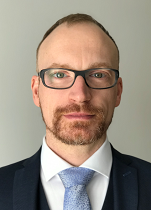Fonctions
 | Professeur des Universités (Linguistique et Didactique de langues) ATILF (UMR 7118), CNRS-Université de Lorraine (Nancy) UFR Sciences Humaines et Sociales, Université de Lorraine (Nancy) - Directeur français de l'European Master in Lexicography (EMLex) - Rédacteur en chef (Editor-in-chief) de la Zeitschrift für Sprachwissenschaft - Journal of the Linguistic Society of Germany (ZS) - Membre du conseil éditorial des revues Pedagogical Linguistics (PL) et Zeitschrift für Katalanistik (ZfK) - Membre du conseil éditorial de la série de livres Current Issues in Bilingualism (CIB) - Expert pour la DFG (SFB et Emmy Noether) |
Coordonnées au laboratoire ATILF
| ORCID | |
| Équipe | Discours |
| Courriel | ingo.feldhausen[at]univ-lorraine.fr |
| Téléphone | +33 (0)3 54 50 53 39 |
| Télécopie | +33 (0)3 83 97 24 56 |
| Lieu | Bureau 017 - rez-de-chaussée - Bâtiment CNRS |
| Adresse | ATILF (CNRS & Université de Lorraine) 44, avenue de la Libération B.P. 30687 54063 Nancy Cedex |
Coordonnées au département SdL (UFR SHS)
| Courriel | ingo.feldhausen[at]univ-lorraine.fr |
| Téléphone | +33 (0) xx xx |
| Lieu | Bureau B225 - 2ème étage - Bâtiment B |
| Adresse | Campus Lettres et Sciences Humaines Département Sciences du Langage 23 Boulevard Albert 1er 54000 Nancy (France) |
Interviewed by the German Linguistic Society (DGfS, 02/2021, interview in German): here
Présentation
Ingo Feldhausen is full professor of Linguistics and Language Didactics at the Université de Lorraine / ATILF in Nancy (France). He obtained his habilitation (postdoctoral dissertation) in 2015 with a thesis on individual variation in intonation in Spanish in the Department of Romance Languages at the Goethe-Universität Frankfurt (Germany). He has held post-doc positions in Frankfurt/Main and Paris (Sorbonne Nouvelle & Paris Diderot) and has carried out various research trips in Argentina and Catalonia/Spain. In 2008, he defended his Ph.D. thesis on the syntax-phonology interface at the University of Potsdam (Germany). He is editor-in-chief of the « Zeitschrift für Sprachwissenschaft – Journal of the Linguistic Society of Germany » (de Gruyter) and a member of the editorial board of the journals « Pedagogical Linguistics » (John Benjamins) and « Zeitschrift für Katalanistik » (OJS).
Research: His research combines empirical/experimental methods and theoretical explanation, focusing mainly on Romance languages such as Spanish, French, Catalan, Italian, and Portuguese. Questions guiding his research include:
- What kind of variation is possible in a human language (monolingual and bilingual/SLA)? And how can variation be integrated into a competence model?
- How does prosody give us hints about syntax and pragmatics/information structure/discourse?
- How to apply and improve research methods?
- What insights from formal linguistics can be applied to language teaching and teacher education? And how can this be done?
Teaching: In addition, Feldhausen is an award-winning lecturer in higher education with a keen interest in language pedagogy and pedagogy of higher education. He obtained a degree in academic teaching in 2014 and later took up the role of trainer himself. His innovative teaching includes the regular development of new courses and teaching methods such as his renowned portfolio work which aims at teaching the core concepts of scientific reading and writing.
 https://orcid.org/0000-0002-5475-1630
https://orcid.org/0000-0002-5475-1630